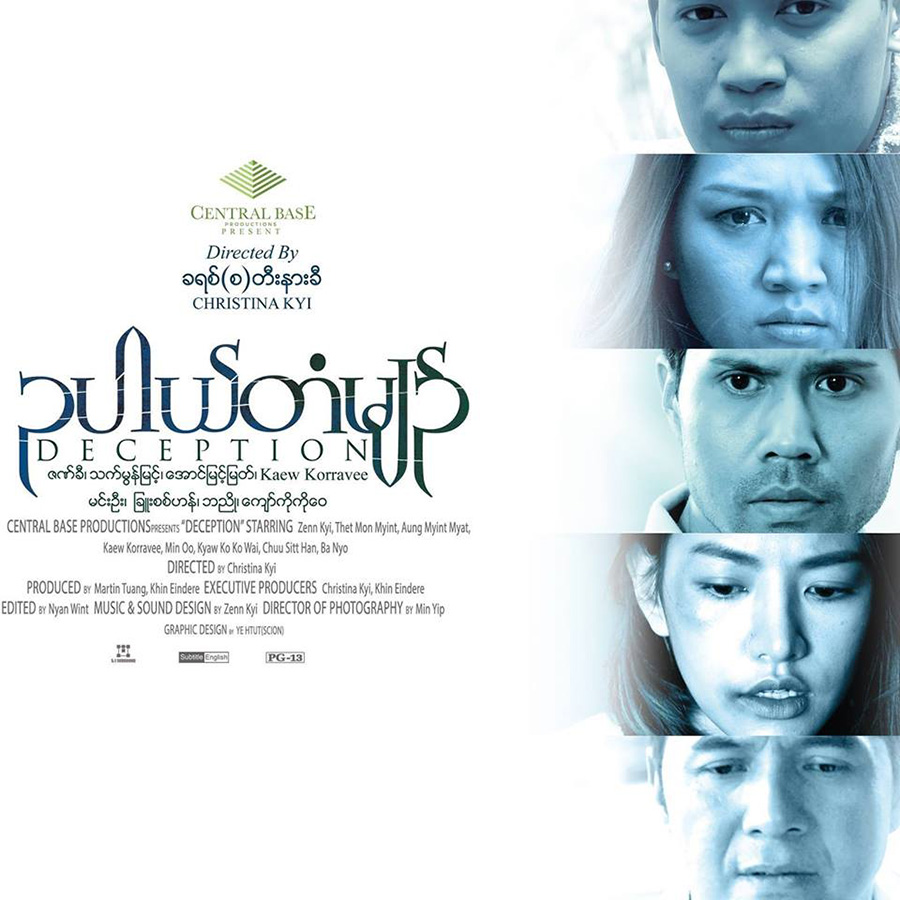YANGON — One discussion that has taken over Myanmar social media in recent weeks is in regards to the country’s mainstream movie industry. The talk revolved around a filmmaker couple whose two newly-released films excited cinemagoers who have been disappointed with a stagnant industry.
Deception and Mudras Calling, released in January and March respectively, received tremendous audience support and filled theaters. Film director Christina Kyi and her partner as well as her production’s in-house actor Zenn Kyi came into the spotlight as “new idols.” Myanmar netizens have taken to social media to show their support for the couple and the two films.
What made the support even more intense was the resistance of some famous mainstream community members and stars who have refused to recognize and receive the new generation of filmmakers with open arms.

Embracing a New Generation of Filmmakers
Enthusiasm and hunger for a ‘new’ cinema stem from the disappointment with many local filmmakers who simply adapt stories from foreign films rather than create their own original stories, and who make comedy movies that mischaracterize the lives of transgender people and disabled communities. Even though Myanmar was one of the earliest countries to produce films in Southeast Asia, the country’s current influence in the regional industry is among the lowest.
Such a situation is sad for an industry with a remarkable cinema legacy that will celebrate its 100-year anniversary in 2020. Despite bizarre censorship and political control by the socialist government, the period from the 1950s to the 1970s and sometimes 80s is viewed by many as the local industry’s “golden age.”
In order to protest the current state of the movie industry, audiences embraced the newcomers even more by turning out in droves to support films made by the ‘Kyi’ couple.
After studying filmmaking in the US, Christina Kyi and Zenn Kyi came back to their home country Myanmar nearly a decade ago and started making their debut feature film Mudras Calling. Due to financial and other production struggles, the film did not make it to theaters until March this year.

Their second film Deception, was released two months before the debut film. It is a twisted drama of a marriage, betrayal, wealth and poverty. While there were shortcomings in the film’s script and execution, Christina Kyi was able to prove that she was a capable director. She was praised for her directorial skill and actors Zenn Kyi and Aung Myint Myat were admired for their acting. The film stayed in local theaters for seven weeks and was also screened in Singapore.
Because of the success of Deception, no exceptional effort was needed to promote Mudras Calling, which featured the same director and lead actor. The film is a story of a US-raised young man’s search for his roots in Myanmar while learning about the country’s traditional music for his master’s degree thesis. Most of the dialogue in the 95-minute film is in English with Myanmar subtitles.
Filmed in the country’s most visited tourist hotspots of Yangon, Mandalay, Bagan and Inle Lake, Christina Kyi was applauded for promoting Myanmar traditions and values. The film also stressed cultural and ideological differences between Myanmar and western societies while depicting a love story between its two lead characters.
Despite flaws in screenplay, character development and technical work, the crew’s years-long effort should be recognized for not following the conventional local practice and for pushing the industry forward.
U Win Pe, a Myanmar Academy Award winner, prolific author, painter and former radio reporter, praised the film as successful entertainment. He particularly appreciated the way the director skillfully mingled Myanmar culture with the film narrative, and said it gave a fresh perspective of the country even to Myanmar audiences.
“The good thing about this film is that it can deliver such a simple narrative in quite an interesting way from the start till the end,” he said. “It gives a balanced ratio of entertainment and knowledge,” he added.

Divide, Scandal, and More
The fundamental difference between the “Kyi” couple and the existing mainstream movie makers is that the two learned filmmaking in college and the latter learned it from elders within the industry. While many young filmmakers cited classical films produced during the golden period as their artistic inspirations, those produced lately are regarded by many as “silly movies.”
While audiences criticize the industry’s low artistic standards and poor creative quality, the industry’s conservative filmmakers still cite the country’s poverty and dictatorship as the root causes of technical challenges in their films.
The real battle came after former actress and member of Myanmar film censorship board Daw Swe Sin Htike metaphorically commented that Mudras Calling was a product made by “urbanites” and other films produced by the existing mainstream industry were made by “villagers.”
The divide between the “Kyi” audience and the existing mainstream industry members got out of control when screenshots of Facebook messenger group chat logs between some members were leaked on social media following the 66th Myanmar Motion Picture Academy Awards ceremony.
The screenshots of the chat history from the “Actors and Actresses” group revealed gossip about the filmmaker couple and strong backlash from the industry figures. The leak seemed to happen after several Facebook accounts of industry celebrities were hacked. While it should not happen to any individual, Myanmar netizens trolled celebrities and movie directors on social media about how they felt threatened by the two filmmakers.
The leak immediately led to a public apology by the chair of Myanmar Motion Picture Organization. Chairman U Zin Wyne, who was also involved in the chat, said he apologized to the couple on behalf of all the members who gossiped, and would like to collaborate with the new generation of filmmakers for the betterment of the industry.
“We always accept newcomers and must also warmly welcome them now,” he said at a press conference on March 26.

What he said was quite questionable as the film Night (Nya)—obviously one of the best films released in 2017— didn’t get any nominations for the Academy Awards this year. The film is a psychological thriller and a debut feature by young filmmaker Htoo Paing Zaw Oo, who is also an award-winning music video director.
Even though it was tipped to be awarded for its outstanding cinematography, sound design, and directing work, it didn’t even get nominated by the award selection board. Many young filmmakers said they felt discouraged by the fact that the industry didn’t recognize the work of the new generation. However, director Htoo Paing Zaw Oo said he will keep making the kinds of films he likes to watch no matter if he gets recognized for it or not.
Many audience members expressed their support for the film and the director on social media by saying they gave the film the audience award. Such crowd support proves that Myanmar audiences are ready for a film revolution and a new wave of cinema.
Tin Htet Paing is a freelance journalist and photographer based in Yangon. She previously worked at The Irrawaddy as a reporter

















